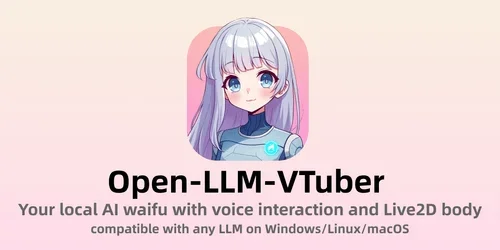Open‑LLM‑VTuber

Description
🖼️ Tool Name:
Open‑LLM‑VTuber
🔖 Tool Category:
AI Characters & Conversations; it falls under the category of AI-powered virtual characters that enable real-time, voice-interactive communication with large language models.
✏️ What does this tool offer?
Open‑LLM‑VTuber is an open-source solution for creating voice-interactive AI characters using LLMs. It integrates audio input/output, real-time talking avatar animation (Live2D), webcam-based gaze tracking, and supports local models through Open-LLM backends. Users can talk to AI without wearing headphones, thanks to echo cancellation, and enjoy realistic interactions via mouth-sync and expressive avatars.
⭐ What does the tool actually deliver based on user experience?
• Real-time voice conversation with local LLMs
• Live2D animated VTuber with mouth sync and gaze tracking
• No-headset voice interaction with built-in echo cancellation
• Multi-turn memory and personality embedding
• Transcripts and conversation logs stored locally
• Full support for local models like LLaMA, Mistral, and ChatGLM
• Runs on consumer hardware with optional GPU acceleration
🤖 Does it include automation?
Yes — Open‑LLM‑VTuber includes automation such as:
• Real-time transcription and response via local ASR and TTS
• Synchronization between voice, avatar animation, and model replies
• Auto-silence detection, interrupt handling, and memory recall
• Automatic avatar behavior based on sentiment or dialogue
• Seamless integration with voice and vision input modules
💰 Pricing Model:
Free and open-source (MIT License)
🆓 Free Plan Details:
• 100% free for personal or commercial use
• No usage limits or locked features
• All source code available on GitHub
• Local/offline usage — no account or internet required
• Community-driven with frequent updates
💳 Paid Plan Details:
• None — the tool is entirely free with no paid upgrades or subscriptions
• Users may optionally support development via GitHub Sponsors
🧭 Access Method:
• Download and run locally via GitHub (Windows/Linux)
• Requires installation of dependencies (Python, FFmpeg, Live2D, etc.)
• Supports Open-LLM backends (e.g., llama.cpp)
🔗 Experience Link: